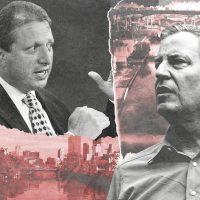The Gowanus rezoning still has some big hurdles to clear when it comes to securing community support — namely whether some of the neighborhood’s poorest will benefit.
Supporters of the proposal, meanwhile, see this as a chance to give new residents a shot at living in a community that is already wealthier than the average Brooklyn neighborhood.
Questions put to the city by the public and local community board during a virtual meeting last week repeatedly returned to whether two New York City Housing Authority complexes, the Gowanus and Wyckoff Houses, would receive upgrades as part of the de Blasio administration’s planned rezoning, which is due to commence sometime next year.
Jonathan Keller, a project manager at the Department of City Planning, acknowledged at the meeting that funding for public housing upgrades was key for winning the approval of community members and some elected officials, but that no deal had yet been made to secure it.
Read more



Brad Lander, the City Council member who represents Gowanus, said in September that concerns over funding for public housing were a sticking point. “It would be morally unacceptable to build this new neighborhood right around the housing developments … but leave almost all the low-income housing in unacceptable, dilapidated condition.”
The proposed rezoning is projected to create 8,000 residential units, 3,000 of which would be affordable. During the meeting, comments in support of the proposal focused on the fact that high earners already call the neighborhood home, and more mixed-income housing would help open Gowanus up to others.
Most of the neighborhood rezonings that have been approved under the de Blasio administration have been in lower-income neighborhoods, including East New York and Inwood. But like Soho, another neighborhood the de Blasio administration hopes to rezone before the mayor’s term ends, the median income in Gowanus is higher than the borough’s average.
The annual median income among households in the rezoning area is $115,000, according to census data, said Keller. (For those living in public housing in Gowanus, it is $39,000.) The median income for Brooklyn households is $56,000, and $60,000 across New York City.
Keller said the rezoning would encourage movement to the area and provide newcomers with a “life-changing” opportunity to grow up near good jobs, schools and housing. The city’s proposal envisions a 1.4-mile commercial corridor on Fourth Avenue from Pacific Street to 15th Street, as well as new schools, although the Department of Education has not offered specifics on what those would be.
Because the virtual meeting was held via Zoom, interactions on video were coordinated by a community board moderator. The comment window, by contrast, was a hotbed of organic community discussion, gathering 640 comments by the end of the nearly three-hour meeting.
“We should focus on NYCHA before any rezoning,” one participant said. Another commented that “every New Yorker has a stake in housing. Gowanus is not a gated community and the people who live there today are not the only ones with a stake in this discussion.”
The city plans to begin the public review process in January. It would culminate with a City Council vote seven months later.
